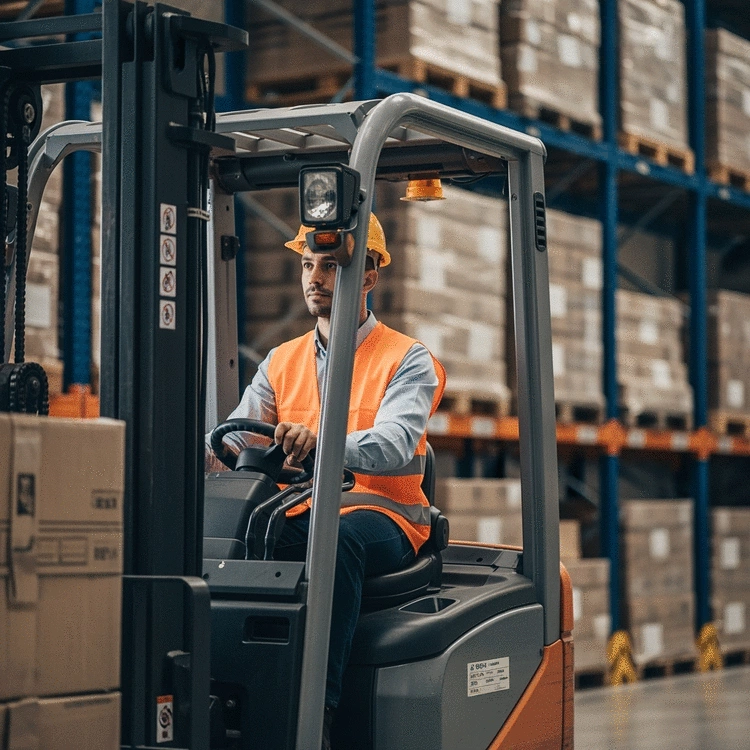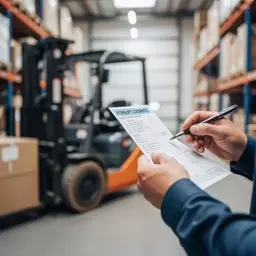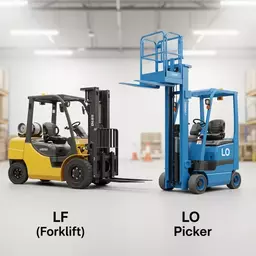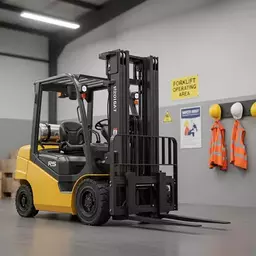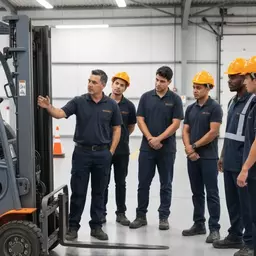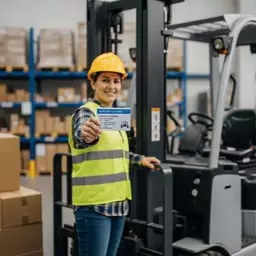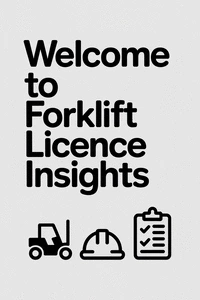What if obtaining your forklift licence could unlock a world of job opportunities while ensuring safety in the workplace? The journey begins by understanding the essential aspects of this crucial certification.
What You Will Learn
- A forklift licence is mandatory for legal operation and enhances workplace safety.
- The two primary types of licences, LF and LO, cater to different forklift operations.
- High Risk Work Licences (HRWL) ensure operators meet safety and competency standards.
- Eligibility requirements include age, identification, and language proficiency.
- Comprehensive training covers theoretical knowledge and practical skills essential for safe operation.
- Ongoing certification renewal is crucial for compliance and skill enhancement.
- Engaging with forklift communities can provide support and networking opportunities.
Key Forklift Licence Requirements & Types
Understanding the essential criteria for obtaining a forklift licence and distinguishing between the main licence types is crucial for aspiring operators in Australia.
Eligibility Requirements
- ✓ Age: At least 18 years old
- ✓ ID: Valid Photo Identification
- ✓ Literacy: Basic English Understanding
Forklift Licence Types
Key Learning Outcomes
- ● Theoretical Knowledge
- ● Practical Skills
- ● Safety Protocols
- ● Inspection Techniques
Importance of Renewal
- ▶ Ensures Legal Compliance
- ▶ Refreshes Operational Skills
- ▶ Boosts Job Marketability
Understanding the Forklift Licence in Australia
If you're looking to operate a forklift in Australia, understanding the forklift licence is essential. This licence not only certifies your ability to handle heavy machinery but also emphasizes the importance of safety in the workplace. Having a valid forklift licence can open doors to numerous job opportunities while ensuring that you meet the legal requirements for operating forklifts in various industries.
But why is this licence so important? Well, it serves as proof that you have the necessary skills and knowledge to operate a forklift safely, reducing the risk of accidents and injuries. In my experience at Forklift Licence Insights, I've seen firsthand how a proper understanding of forklift operation can protect both workers and businesses.
What is a Forklift Licence and Why is it Important?
A forklift licence is a certification that allows individuals to operate forklifts safely and legally. The significance of this licence cannot be overstated! Without it, not only are you operating illegally, but you’re also putting yourself and others at risk. The training to obtain this licence covers essential knowledge on safety protocols, equipment handling, and workplace regulations.
- Ensures legal compliance for operators
- Reduces workplace accidents and injuries
- Enhances employability in various sectors
In essence, having a forklift licence demonstrates your commitment to safety and compliance, making you a valuable asset in any workplace. It’s not just about getting the certification but understanding the responsibilities that come with operating heavy machinery. For more detailed information on general safety duties and how they apply to operating machinery, refer to the Safe Work Australia website.
Different Types of Forklift Licences: LF vs. LO
In Australia, there are two primary types of forklift licences you might encounter: the LF (forklift) and the LO (order picker). Each serves a unique purpose, reflecting the specific skills required for different forklift operations.
- LF Licence: This is the most common type, allowing the operation of standard forklift trucks and other lift trucks.
- LO Licence: This licence is specifically for operating order picking forklifts, which are designed for efficiently picking orders from racks.
Understanding the distinction between these licences can greatly influence your career path. Depending on your goals in the forklift operating industry, choosing the right licence is crucial for your future employment opportunities!
Overview of High Risk Work Licences (HRWL) in Australia
It's important to note that a forklift licence falls under the category of High Risk Work Licences (HRWL) in Australia. HRWLs are mandated by the government to ensure that operators are adequately trained and assessed for their competency in operating high-risk machinery. This includes not only forklifts but also cranes and other heavy equipment.
To obtain an HRWL, you must complete a training course through a Registered Training Organisation (RTO) and pass the required assessments. This process ensures that all operators maintain a consistent level of safety and skill across the industry. At Forklift Licence Insights, we emphasize the importance of ensuring your training is with a reputable RTO to guarantee quality instruction.
- Assessment of theoretical knowledge and practical skills
- Regular updates on safety and compliance protocols
- Enhanced career opportunities with a recognised qualification
By understanding HRWLs, you can better navigate the requirements of the forklift licensing process and set yourself up for success in the industry!
Frequently Asked Questions about Forklift Licences
- What is the minimum age to obtain a forklift licence in Australia?
- You must be at least 18 years old to be eligible for a forklift licence.
- What are the two main types of forklift licences?
- The two main types are the LF Licence (for standard forklift trucks) and the LO Licence (for order picking forklifts).
- What is a High Risk Work Licence (HRWL)?
- An HRWL is a government-mandated licence for operating high-risk machinery like forklifts, ensuring operators are trained and competent.
- Why is a forklift licence important?
- A forklift licence ensures legal compliance, reduces workplace accidents, and enhances employability by proving an operator's skills and adherence to safety protocols.
- How often do I need to renew my forklift certification?
- Regular certification renewal is essential for maintaining your skills, staying updated on safety regulations, and ensuring ongoing compliance and marketability.
Engage With Us!
As you consider your journey towards obtaining a forklift licence, we want to hear from you! What challenges or questions do you have about the licensing process? Share your thoughts below:
Recap of Your Journey to Acquiring a Forklift Licence
Congratulations on taking the first steps towards acquiring your forklift licence! It's a journey filled with learning and essential knowledge about safety and operations. Let’s recap some key takeaways to help solidify your understanding.
Key Takeaways on Eligibility and Training
Understanding the eligibility requirements and the training process is crucial for your success. Here's a quick overview:
- Age Requirement: You must be at least 18 years old to operate a forklift.
- Identification: A valid form of identification is required, such as a driver's licence or passport.
- Language and Literacy: Basic understanding of English is necessary to follow safety protocols and instructions during training.
- Training Course: Enroll in a course provided by a Registered Training Organisation (RTO) that offers nationally recognised training.
By keeping these points in mind, you can navigate the initial requirements smoothly. Remember, each step you take is a building block towards becoming a capable forklift operator!
Understanding Learning Outcomes from Your Forklift Course
Upon completing your forklift training, you should have a solid grasp of several key competencies. Here’s what you can expect to learn:
- Theory Knowledge: Understanding the principles of safe forklift operation, including load management and stability.
- Practical Skills: Hands-on experience in operating various types of forklifts.
- Safety Protocols: Knowledge of workplace safety regulations and emergency procedures. For example, understanding safe operating procedures, as detailed in this forklift safety guide for workers, is critical.
- Inspection Techniques: How to conduct pre-operational checks and maintenance on forklifts.
These learning outcomes are designed to prepare you for both your assessment and real-world operation. The knowledge you gain is invaluable for ensuring safety in the workplace and enhancing your confidence as a forklift operator!
Next Steps for Aspiring Forklift Operators
Now that you have a clearer understanding of the journey ahead, let's discuss your next steps. Taking action is key to moving forward in your career as a forklift operator!
Finding a Suitable Forklift Training Course in Your Area
Start by researching local Registered Training Organisations (RTOs) that offer forklift training. Here are some tips to help you choose the right course:
- Reputation: Look for reviews and testimonials from past students.
- Course Content: Ensure the course covers both theory and practical training.
- Location: Choose a training centre that is convenient for you.
- Cost: Compare prices but be wary of options that seem too cheap; quality training is essential!
Finding a reputable course sets you on the right path towards obtaining your licence!
Engaging with Forklift Communities and Resources for Ongoing Support
Once you’ve started your training, consider joining forklift-related communities. Engaging with others can provide you with valuable insights and support. Here are some avenues to explore:
- Online Forums: Participate in discussions about best practices and safety tips.
- Local Meetups: Attend gatherings or workshops to connect with fellow operators.
- Social Media Groups: Join Facebook or LinkedIn groups focused on forklift operation.
Being part of a community fosters ongoing learning and can open doors to job opportunities!
Importance of Forklift Certification Renewal and Requalification
Finally, remember that obtaining your forklift licence is just the beginning. Regular certification renewal is essential for maintaining your skills and staying updated on safety regulations. Here’s why you should prioritize this:
- Compliance: Ensure you meet the legal requirements to operate a forklift safely.
- Skill Refreshment: Stay sharp with your operational skills and knowledge of safety protocols.
- Marketability: Keep your qualifications current to enhance your job prospects.
By committing to ongoing education and certification, you not only ensure your safety but also boost your career potential! Ready to take the next step? Your future as a skilled forklift operator awaits!
Recap of Key Points
Here is a quick recap of the important points discussed in the article:
- A forklift licence is essential for legal compliance and workplace safety.
- There are two primary types of forklift licences: LF (forklift) and LO (order picker).
- Forklift licences fall under High Risk Work Licences (HRWL) and require training through a Registered Training Organisation (RTO).
- Key eligibility requirements include being at least 18 years old and having a valid ID.
- Completing a forklift training course equips you with essential safety knowledge and practical skills.
- Regular certification renewal is crucial for compliance and skill maintenance.
